Aug 2017 1st Edition
Aug 2017 1st Edition Joy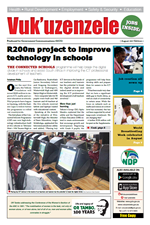
Translations
R200m project to improve technology in schools
R200m project to improve technology in schools Estelle GreeffThe connected schools programme will help break the digital divide in schools and assist South Africa in improving the ICT professional development of teachers.
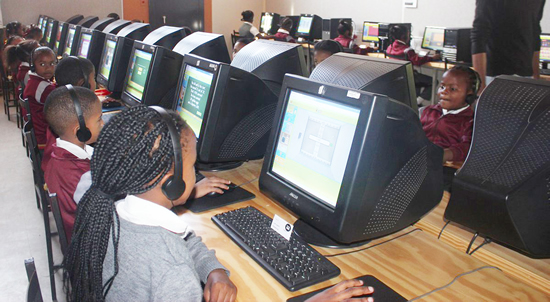 Over the next five years, the Telkom Foundation will invest R200 million to improve ICT, maths and science education in schools. Pilot projects have begun in Gauteng, with the Eastern Cape to follow before the programme is rolled out countrywide.
Over the next five years, the Telkom Foundation will invest R200 million to improve ICT, maths and science education in schools. Pilot projects have begun in Gauteng, with the Eastern Cape to follow before the programme is rolled out countrywide.
The first phase of the Connected Schools Programme (CSP) saw new high-technology infrastructure built at five schools in Tshwane West – NM Tsuene High in Ga-Rankuwa, Ruabohlale Junior Secondary School and Seageng Secondary School in Soshanguve, Winterveldt High and MH Baloyi High in Winterveldt.
New computer labs for 50 pupils were built and 943 learners and 60 teachers at the five schools received tablets and laptops loaded with educational content.
Speaking at the launch of the initiative at Winterveldt High, the Minister of Basic Education, Angie Motshekga, applauded the telecommunications utility and added, “Placing key ICT devices in the hands of our teachers and learners has the potential to break the digital divide and indeed assist us in improving the ICT professional development of all teachers involved.”
More than just learning
Telkom’s Group CEO, Sipho Maseko, explained that the utility and the Department of Basic Education (DBE) intend to create environments that encourage growth and development. Beginning with Grade 8 pupils, the programme will help them develop skills and prepare them for careers in the ICT sector.
“It has been made very clear that we have a significant skills gap in South Africa, as well as a lack of connectivity in certain areas. While the focus on subjects such as maths and science at a school level has increased, this has not been supported by actual large-scale investment. We are changing that.”
A further R130 million will be spent on the Supplementary Programme to help improve the quality of matric passes. The funds will be spent on teacher training and social programmes to support students through high school and university. School children will also benefit from enterprise development training once they have qualified.
Teaching the teachers
Grade 8 teachers from the Tshwane schools spent their April holidays at an ICT boot camp funded by the Telkom Foundation. The SchoolNet programme taught them basic ICT skills that could be used to prepare more interesting lesson plans.
One of the teachers, Mpho Ngubane of Ruabohlale Secondary School, enjoyed the training because it was so practical and presented in a way that showed him how to use what he learnt in a classroom setting. “We will continue to receive guidance [from Telkom] on how to change our current teaching practices. This will excite and challenge learners and teach them to become independent thinkers.”
Thabo Mhlongo, a teacher at Seageng Secondary School, found the training useful because of its emphasis on how to integrate ICT in the classroom. The SchoolNet programme has motivated him to find new ways to teach. “As teachers get excited, they feed this excitement to learners and a whole new cycle of motivation to do better is fostered at school.”
Irene Sebate is a Setswana and maths teacher at MH Baloyi High School and believes the SchoolNet and CSP programmes will allow teachers to learn from their students as much as they will teach. Being born before technology can no longer be a teacher’s excuse, she said.
“Some people may feel that there is burden to learning new skills; however, in the long run, education must empower our learners for the world out of school. Teachers cannot sit back and not actively engage with learners’ needs in the 21st century.”
Operation Phakisa ICT
At the launch, Minister Motshekga tied the CSP initiative to the ICT-led education system spelled out in the National Development Plan (NDP). “The NDP states that ICT is seen as an enabler with the potential to speed up delivery, support analysis, build intelligence and create new ways to share information, learn and engage.”
The Operation Phakisa ICT Masterplan will provide digital content that will be distributed using offline and online platforms, provision of connectivity, hardware, teacher professional development and e-Administration systems.
The DBE has partnered with UNICEF to launch the Professional Development Framework for Digital Learning that will guide the development of teaching staff ICT skills.
Telkom’s funding will ensure that schools take a leap into the digital future. As the Minister said at the end of her speech, “The NDP envisions a South Africa where everyone feels free yet bounded to others; where everyone embraces their full potential, a country where opportunity is determined not by birth, but by ability, education and hard work. Today, we are planting the seeds of this great future.”
Bright beginnings for children of Mookgophong
Bright beginnings for children of Mookgophong Estelle GreeffNew early childhood development centre will help prepare young children for primary school.
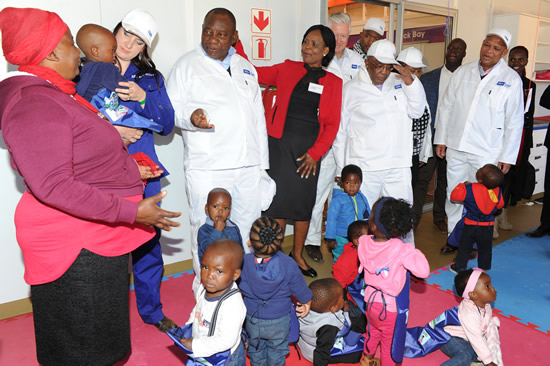 Children need to play. It is an important part of childhood development. A new early childhood development (ECD) centre in Mookgophong, Limpopo, will give the community’s children the opportunity to learn through play.
Children need to play. It is an important part of childhood development. A new early childhood development (ECD) centre in Mookgophong, Limpopo, will give the community’s children the opportunity to learn through play.
The handover ceremony for the Ramadimetja Sophia Mogotlane Early Childhood Development Centre was incorporated into the area’s Mandela Day celebrations.
As Deputy President Cyril Ramaphosa explained when he opened the centre’s doors, “This will ensure that children meet the normative developmental milestones of being able to read, write and count when they start primary school.”
Mammoko Ramokgopa, an early childhood development specialist in the Department of Basic Education said it was important that children get the best education and care at the very early age as this foundation becomes critical later in their lives.
“See it as building a house. If you don’t get the foundation right, the house will not stand strong. It is therefore critical that we provide the children with the best care and education while they are still very young as this builds them and makes them better and stronger human beings later in their school lives and through to university,” said Ramokgopa.
The construction was funded by pharmaceutical company Cipla and is an extension of a creche that was run from a shack in the 28 000-strong community.
Along with educational toys and playground equipment, the school offers its 105 children access to visiting health staff and age-appropriate computer training.
Meeting challenges
The informal school that gave rise to the new centre battled to retain trained staff and did not have appropriate play areas for the children, said principal Maria Molotsi.
She added that although the new facility had already had positive impacts, the community has insufficient ECD centres. “There are many children that have to stay at home while their parents work.”
In addition, many little ones still come to school hungry.
But her facility is a beacon of hope. She explained that her school now has five teachers and a cook. Along with the educational and play opportunities, Molotsi has devised a menu that meets the children’s daily healthy meal requirements. Previously undernourished children are now fed fresh vegetables from the school’s own vegetable patch.
She is proud of the fact that when the children go on to primary school, they will be able to count, read, write and get along with others.
Molotsi has one expectation when the children leave her creche. “When they go to school, the teachers must say that the children from the Ramadimetja creche are bright and beautiful.”
Improving conditions of women is good for development
Improving conditions of women is good for development Estelle GreeffAs we begin to celebrate Women’s Month, let’s make South Africa a country where women can achieve their true potential.
In his message for the Year of the Women in 1984 Oliver Reginald Tambo said that one of the most important tasks of the liberation movement was the liberation of the women of our country from their triple oppression on the grounds of sex, class and colour.
We remember these forceful words this August. We celebrate this year’s Women’s Month under the sub-theme “The Year of OR Tambo: Women United in Moving South Africa Forward”. In this 61st year since the historic women’s march in 1956, we pay tribute to the brave women who confronted unjust apartheid laws over many years and in 1956 in particular for playing that important role in ushering in a democratic government. We also elevate, celebrate and draw inspiration from many women achievers in various sectors in our society.
Since the dawn of freedom, our government has been committed to improving the conditions of the women in this country, and has made very considerable strides in this undertaking, which also consolidates our democracy.
Accelerating economic inclusion
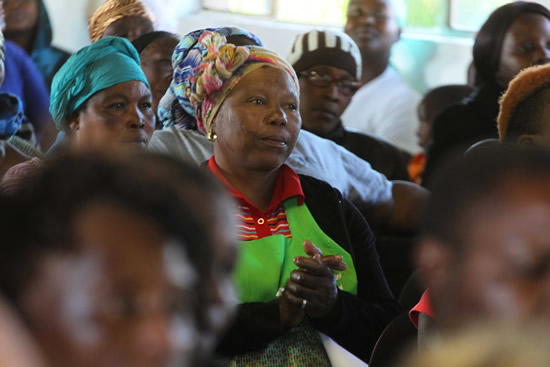 In various departments government is ensuring a particular deliberate bias towards women, as the majority section of our population, in the provision of business and other economic opportunities so as to accelerate the goal of economic inclusion. The Department of Small Business Development, in particular, has seized the opportunity to affirm women in the range of opportunities that it offers, but here, as in any sector, there is still a glaring need for more women to ensure fair representation and participation.
In various departments government is ensuring a particular deliberate bias towards women, as the majority section of our population, in the provision of business and other economic opportunities so as to accelerate the goal of economic inclusion. The Department of Small Business Development, in particular, has seized the opportunity to affirm women in the range of opportunities that it offers, but here, as in any sector, there is still a glaring need for more women to ensure fair representation and participation.
There are many opportunities in the agricultural sector, including the agro-processing supply chain, which are open to women. We urge women to be involved in developing food gardens so that we use the soil to produce food. Women should form cooperatives as well. Many such cooperatives already supply food for government’s school food nutrition scheme, while many women also have opportunities to cook for children at schools and have an income.
Women also work in many of the Expanded Public Works Programme projects including repairing roads, looking after the sick as caregivers, and clearing vegetation. Government will continue to roll out these projects as part of alleviating poverty and providing skills to women.
South Africa must be safe for women and children
This Women’s Month we will also highlight the scourge of violence against women and children. This year has seen heightening incidents of women and child abuse, some very gruesome.
Through the 365 days campaign, we have made a year-in-and-year-out commitment to protect women and children from violence and all forms of abuse. South Africa must be safe for women and children.
Nobody has the right to attack women. We urge women to report perpetrators to the police, who have been instructed to treat such cases seriously and with urgency. Women must not tolerate abuse at home, in particular by husbands or partners. The silence must end. Family members must also not tell women not to report such. This is criminal and must be end.
Our democratic constitution, though the Bill of Rights, provides for gender equality. An important development is that our judiciary is also transforming to include more women. For example, of the 154 candidates who were appointed as district magistrates across the country in 2015, 90, or 59 per cent, were women. In April this year 48 senior magistrates were appointed, 48 per cent of them were women. Nationally, of the 1 570 or so magistrates in the country, 702, or 45 per cent, are women. Superior courts also have to ensure that they reflect this change.
In government, the legislature and civil service we have also made efforts to ensure gender equality and opportunities for people with disabilities.
As we begin to celebrate Women’s Month, we urge everyone to participate in making South Africa a much safer place for women, and a country where women can achieve their true potential and use opportunities to create better lives for themselves.
Let us all support the programmes and activities that have been planned for Women’s Month and move our country forward towards a better life for women and households.
Job creation all sewn up
Job creation all sewn up Estelle GreeffWomen's Month
The lives of unemployed women from poverty-stricken communities around Durban are set to change for the better. A programme run by the KwaZulu-Natal Department of Arts and Culture, in collaboration with Durban fashion designer Greg Wallis and Jirah Fashion Factory, has given them an opportunity to begin work in the clothing industry.
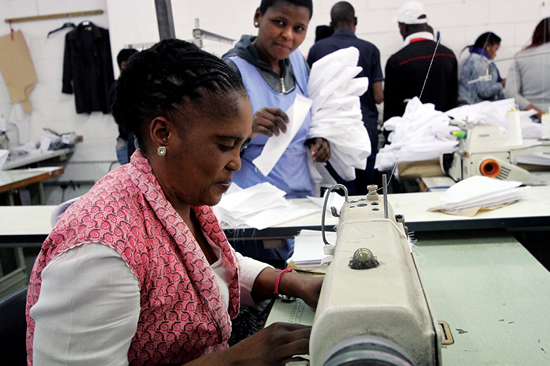 At the beginning of June, the women began five weeks of theoretical and practical training. The training included an introduction to design and pattern-making, working on a machine as well as other clothing and textile-related functions. Each trainee will be issued with a certificate at the end of the workshop.
At the beginning of June, the women began five weeks of theoretical and practical training. The training included an introduction to design and pattern-making, working on a machine as well as other clothing and textile-related functions. Each trainee will be issued with a certificate at the end of the workshop.
This is the second group of women to undergo training, and the number of applications had grown since the first training programme ran last year.
Designer Wallis explained: “Participants are split into two groups, rotating lesson times between morning and afternoon. Half of the 2016/17 participants have since found employment, some at the Jirah Fashion Factory.”
Benefits
One the participants, Bathobile Zincube, 38, encouraged rural women to grab opportunities like this because they were rare. “I was sitting helpless at home without a job. But now I am employed here at the Jirah Fashion Factory. The money I will be getting will help me to provide for my kids and look after myself,” she said.
Another participant, Nombifikile Mtolo, 44, said she was thankful for the chance to be part of the training. “I am not looking for employment but I will create employment myself. I am planning to manufacture school uniforms, clothes, clothing peg bags and bedding. The skills that we have got here will help us provide for our families. We thank the government for considering us rural women in opportunities like this,” she said.
A hand up
The initiative, which forms part of government’s Comprehensive Rural Development Programme, aims to tackle underdevelopment, food security, unemployment, poverty and other social ills prevalent in rural areas.
Department of Arts and Culture MEC Bongiwe Sithole-Moloi said the initiative would create a well-trained, reliable workforce in the clothing industry.
“The project is in line with government strategies to build an inclusive economy and create jobs. We are determined to see previously disadvantaged people like women taking charge of their lives and being active participants in the growth and development of the province’s economy.
“We are proud of the strides being made by the project. Trainees could find entry-level salary jobs in the clothing industry using the training they are receiving, which will assist in alleviating unemployment and poverty,” she said.
Teaching girls computer code ignites futures
Teaching girls computer code ignites futures Estelle GreeffWoman's Month
A non-profit computer science training centre is inspiring Africa’s future generation of technology entrepreneurs and innovators to reach for the stars.
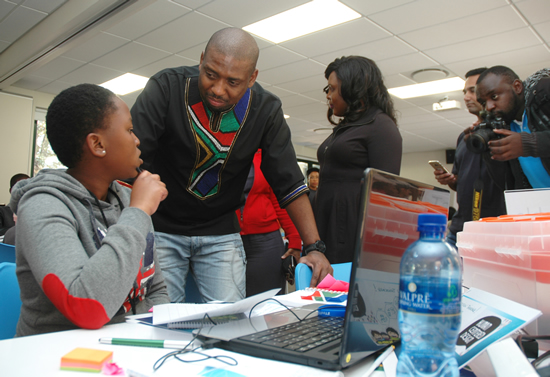 Lindiwe Matlali doesn’t believe that not having a computer should stop you from learning how to use one. Or even how to code.
Lindiwe Matlali doesn’t believe that not having a computer should stop you from learning how to use one. Or even how to code.
The founder of Africa Teen Geeks believes if you have access to a computer, you can find free online tools that will teach you how to code. If you don’t, then you can use Matlali’s innovative approach to learn Python, a computer language.
“We have already created a platform called Knit2Code, on which we teach young girls Python using knitting. They learn to write a Python code for the South Africa flag and a scarf. This is what we call computing without a computer to remove the barriers for disadvantaged children who do not have access to a computer or the internet.”
Matlali believes we need to motivate children, especially young girls, to see themselves as creators of technology and not just consumers. “Our focus is to raise their aspirations to not only be content about knowing how to use technology, but to create it.”
African Teen Geeks bridges the gap between understanding that technology matters and the lack of computer science education in schools. Matlali teaches not just coding but how to use technology to make a difference. The Fourth Industrial Revolution, she says, is one way that South Africa can meet and beat the youth unemployment challenge.
“If they are innovative, they will not join the unemployment lines but will create employment for themselves and their communities. We want to inspire a generation that doesn’t aspire to be employed but rather to be game changers and trailblazers.”
Since 2014, African Teen Geeks has taught 38 000 children to code. Matlali’s NGO has also developed a teacher training programme that offers courses and coaching for teachers who want to introduce a coding curriculum at their school.
The teacher training courses began when Matlali noticed how many donated computer labs had turned into white elephants because there were no qualified teachers. “Our courses are designed to ensure lessons are taught well, both in theory and practice.”
New courts bring justice closer to the people
New courts bring justice closer to the people Estelle GreeffThe Department of Justice is building new magistrates’ courts and high courts across the country, giving better access to justice services.
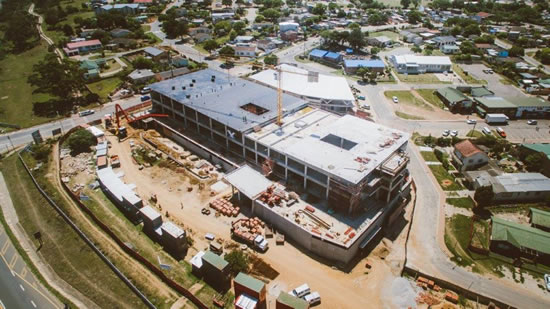 Residents of Plettenberg Bay in the Western Cape only have a few months to wait before they will be served by a new magistrates’ court, doing away with the 64-kilometre journey from Plettenberg Bay to Knysna to access justice services.
Residents of Plettenberg Bay in the Western Cape only have a few months to wait before they will be served by a new magistrates’ court, doing away with the 64-kilometre journey from Plettenberg Bay to Knysna to access justice services.
The new court is necessary because the Western Cape has the heaviest case load on its district court rolls. It currently has 45 000 cases, with Gauteng following with
36 000 cases.
Deputy Minister of Justice John Jeffery recently visited the site to inspect construction of the court.
“I am happy with the progress. Everything seems to be working according to schedule,” he said.
“Plettenberg Bay had a periodic court which only dealt with minor crimes. Now it is going to have a fully fledged court that will enable members of the public to report serious crimes.”
The building will have 12 court rooms. There will be two sexual offences courtrooms, four criminal courts, two regional and two family courtrooms as well as a civil and an equality court. Over 30 000 people are expected to be served by the new court.
It will also feature state-of the-art security systems, a secure accused offloading area leading to the courtrooms, offices for magistrates and prosecutors, child maintenance and domestic violence facilities, ample public waiting areas and parking facilities.
Provincial high courts
In total, South Africa has 763 magistrates’ courts and 13 high courts. Of these, 45 new courts were built in the past 20 years, mostly in previously underserviced areas.
The new Limpopo High Court opened the 2016/17 financial year. The Mpumalanga High Court, also the first high court for the province, is scheduled for completion during this financial year.
Another new magistrates’ court to be completed this year is in Dimbaza, Eastern Cape, which is also being upgraded from a periodic court.
In Gauteng, the Justice Department is upgrading the Mamelodi Magistrate’s office from a branch court to a fully fledged court. And in KwaZulu-Natal, the Port Shepston magistrates’ court will be completed in September.
Over the medium term, the Department has allocated R6.2 billion for infrastructure development and maintenance, property leases, municipal services and accommodation charges across the country.
Sibusisiwe Mzila works in the Communications Unit in the Department of Justice.
Assisting landlords and tenants
Assisting landlords and tenants Estelle GreeffThe Rental Housing Tribunal helps landlords and tenants solve disputes.
 Renting out a property, such as a backroom, flat or cottage can bring in extra income, but dealing with rowdy tenants can be a hassle and could cause frustration.
Renting out a property, such as a backroom, flat or cottage can bring in extra income, but dealing with rowdy tenants can be a hassle and could cause frustration.
For problems between landlords and tenants, one of the first ports of call is the Rental Housing Tribunal.
The Rental Housing Tribunal is a government entity that falls under the provincial departments of human settlements or housing.
The tribunal, a dedicated body that can resolve disputes between tenants and landlords, is an alternative to costly court action.
Like many tribunals, the Rental Housing Tribunal has certain powers and its ruling is the same as that of a magistrate.
The tribunal has the power to summon a landlord or tenant to a hearing or mediation, can order a landlord or tenant to comply with any part of the Rental Housing Act and can impose a fine or imprisonment on both the tenant or landlord.
It must be noted that the tribunal’s powers cover issues of landlords and tenants of residential buildings – it does not, for example, cover business or commercial properties.
The complaints can be about things like the non-payment of rentals, failure to refund a deposit, invasion of tenant’s privacy, unlawful seizure of tenant’s goods, discrimination by a landlord against a prospective tenant, receipt for payment not issued, lack of maintenance and repairs and illegal lockout or illegal disconnection of services.
The services rendered by the tribunal are free.
For more information, download the Rental Housing Tribunal fact sheet from the Department of Human Settlements website: www.dhs.gov.za/content/rental-housing-tribunal
Call the national office on 012 444 5212 for provincial tribunal information.
Charmaine Mrwebi, dreaming and writing in Setswana
Charmaine Mrwebi, dreaming and writing in Setswana LondekileEveryone should read, says Charmaine Mrwebi. The published author, librarian and founder of the Charmza Literary Club says: “Our people should often visit our libraries and become friends of books. Remember, any person who reads books on a daily basis, develops better listening skills. Reading helps learners and students to perform better at school.”
Charmza Literary Club visits schools around Thaba ’Nchu, her hometown, where she shares her love of reading and its importance.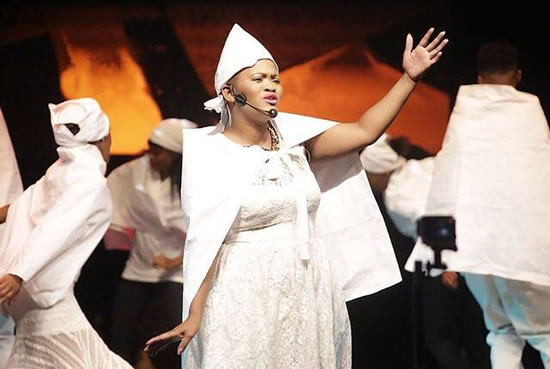
She wants to empower communities to tell their stories in their own language. “We also teach adults the necessary writing steps on how to write their books, edit and publish them in their language.”
Mrwebi uses her school visits to identify young writers to mentor. “We conduct poetry readings once a month in different schools where we encourage pupils to read and write poems.”
Once they have been identified, Mrwebi will “donate books to these writers after they have formed their book clubs, poetry groups and reading clubs”.
Ongoing work
Since 2015 this Bloemfontein-based writer and publisher has partnered with the Mangaung Cultural Festival to present the Mokete Storytelling Picnic. Using storytelling and puppet shows, Mrwebi and her crew entertain children in Setswana.
In addition, every Tuesday Mrwebi and the Charmza team host workshops at the Performing Arts Centre of the Free State for school children. “For one hour after school we work with children. We teach children that performing arts are a tool to understand their world and their lives.”
Growing up in Thaba ’Nchu, Mrwebi was a voracious reader. She has often spoken about how reading allowed her to travel the world without leaving her home. But she yearned to find books written in Setswana, her mother tongue, about her own experiences.
She believes it’s important to read, and write, your own literature. Writers, she says, think and dream in their mother tongue and something is lost when it is translated. Desperate to share her culture with the world, she has self-published four books in her mother tongue.
She is hopeful that, like her, there is a young Setswana writer somewhere who will be inspired to tell his or her own story. And who inspires Mrweb? Her grandmother Ellen Kuzwayo, the award-winning author of Call Me Woman.
Farming as a career planted in young minds
Farming as a career planted in young minds JoyA KwaZulu-Natal programme plans to change the image of farming among young people and expose them to the many job opportunities in the agriculture sector.
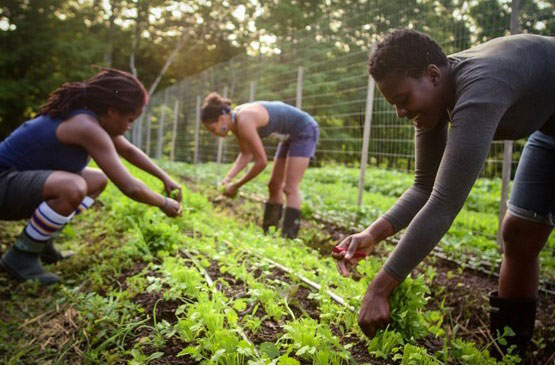 The lives of young KwaZulu-Natal residents passionate about farming are set to change for the better, thanks to the province’s young farmers’ development programme.
The lives of young KwaZulu-Natal residents passionate about farming are set to change for the better, thanks to the province’s young farmers’ development programme.
The programme is a partnership between the KwaZulu-Natal Department of Agriculture and Rural Development (DARD) and Denmark’s Dalum Agricultural College – the largest and oldest agricultural college in Denmark.
While the initial focus of the programme was the development of young farmers participating in the livestock sector, it has now been expanded to include agro-processing.
MEC for Agriculture and Rural Development Themba Mthembu said this partnership would strengthen KwaZulu-Natal’s capacity for agribusiness and agro-processing.
“The Danish agricultural sector has vast international agricultural and agribusiness experience; 20 per cent of Danish production is performed abroad.
“Denmark has valuable knowledge and experience in advanced technology, animal welfare systems, food safety systems, traceability certification, farm waste management and alternative energy technology,” the MEC said.
The programme would continue for the next three years, with funding provided by DARD.
Changing the face of farming
It was important to the department to change the image of farming, MEC Mthembu said.
“The province’s strategy for agrarian transformation recognises that the future of agriculture in the province depends on growing the number of young farmers,” he added.
The average age of South African commercial farmers was around 63, the MEC noted. “It is imperative that we as government, in cooperation with the farming sector, find ways to attract young people to farming and open up opportunities to them.”
He added that for South Africa to achieve food security and for agriculture to become a catalyst for economic growth in the country, the participation of young people was critical.
Opportunities needed to be more than simply training people for jobs. “They must encourage young people to become agricultural entrepreneurs,” MEC Mthembu said.
“Given our country’s history, most young people view agriculture as work for labourers.”
The department also intended to educate learners in primary school. “Our plans involve career guidance to make the learners aware of the professional aspects as well as the business and scientific nature of the sector.
“In KwaZulu-Natal they will certainly be given special attention and support as we endeavour to grow our future farmers,” the MEC said.
Youngsters selected for the young farmers’ development programme must:
- be involved in agriculture, either as a land-reform beneficiary or privately,
- have matric with mathematics and science (agriculture would be an added advantage),
- have a good command of English,
- have 12 months’ work experience, and
- be a South African citizen.
For more information on the programme, contact yfdp@ada-kzn.co.za or call 033 347 8600.
Giving life to Madiba’s legacy
Giving life to Madiba’s legacy LondekileSouth Africans walked in Madiba’s footsteps on Mandela Day, spreading a little of his legendary magic wherever they went.
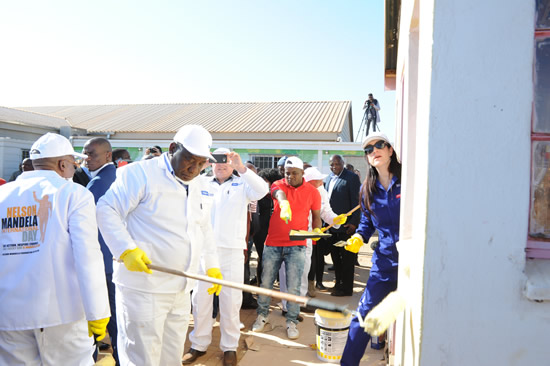
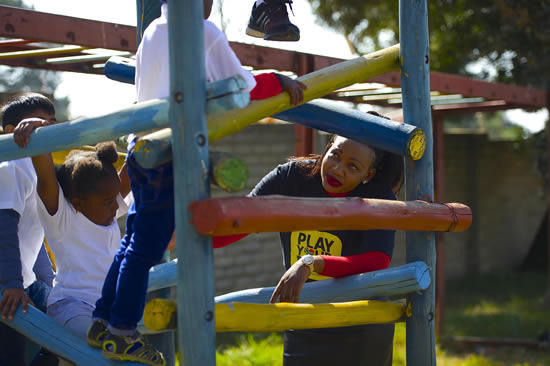
Government officials embraced the Mandela Day theme of Action against Poverty on 18 July.
They joined other South Africans in giving of their time to “clean, care and unite together as one” to create a more wholesome environment for the country’s vulnerable citizens.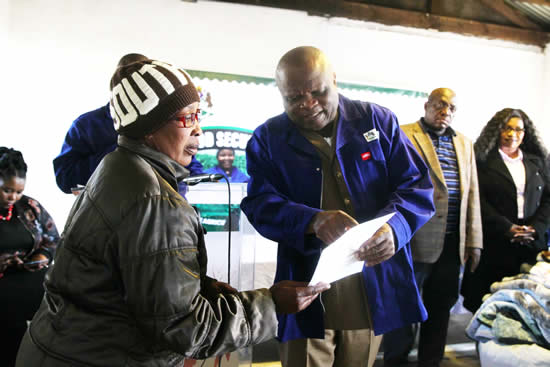
The Department of Energy focused on youth development, a cause close to Nelson Mandela’s heart. Minister Mmamoloko Kubayi split her day between the Odi Hospital in Mabopane and Aga Sechaba Youth Centre in Ga-Rankuwa.
She served breakfast to women on the surgical ward and handed toys to children in the paediatric ward. In Ga-Rankuwa she donated furniture, computers and stationery to pupils.
At the Chatty 491 Military Veterans Project in Port Elizabeth, Minister of Human Settlements Lindiwe Sisulu handed the keys to new homes on serviced sites to veterans.
North West Premier Supra Mahumapelo visited children at the Ikhaya La Bantwana orphanage in Ikageng where he spent the day cleaning and serving meals. Before leaving, he handed out gifts to the children.
In Pietermaritzburg, Deputy Minister of Environmental Affairs Barbara Thomson opened the JC Joshua Pre-Primary School’s resource centre in Eastwood before handing out educational toys and books and soccer and netball kits. She also handed out gifts to the Eastwood Elderly Club.
“All that we are trying to do is follow in the footsteps of our icon, Tata Nelson Mandela. I agree [with Nelson Mandela] that the only weapon at our disposal is education,” she said.
Deputy Minister of Communications Tandi Mahambehlala and the South African Men’s Hockey Team spent Mandela Day at the New Jerusalem Children’s Home in Midrand. For her the day is about giving of yourself to make people happier and content.
Jobs: Department of Labour - Aug 2017
Jobs: Department of Labour - Aug 2017 JoyPrincipal Inspector: Explosives/MHI
Provincial Office: Gauteng
Ref No: HR4/4//4/06/27
Salary: Commencing: R 417 552 per annum
Enquiries: Mr L Raphela, Tel: (012) 309 5256
PROVINCIAL OFFICE
Chief Director: Provincial Operations: P O Box 4560, Johannesburg, 2001
Principal Inspector: Basic Conditions of Employment Act
Provincial Office: Kimberly
Ref No: HR 4/4/8/268
Salary: Commencing: R 417 552 per annum
Mr IS Vass, Tel: (053) 8381500
PROVINCIAL OFFICE
Chief Director: Provincial Operations: Private Bag X 5012, Kimberly, 8301 or hands deliver at Cnr Compound and Pniel Road
Deputy Director: Beneficiary Services
Provincial Office: Free State
Ref No: HR4/4/8/94
Salary: All inclusive: R657 558 per annum
Enquiries: Ms NP Douw-Jack, Tel: (051) 505 6203
PROVINCIAL OFFICE
Chief Director: Provincial Operations: P O Box 522, Bloemfontein, 9300 or hand deliver at Laboria House, 43 Charlotte Maxeke Street, Bloemfontein
Assistant Director: Communication
Provincial Office: Mmabatho
HR 4/4/9/244
Commencing: R334 545.00 per annum
Mr GC Morebodi, Tel: (018) 387 8146
PROVINCIAL OFFICE
Chief Director: Provincial Operations, Department of Labour: Private Bag X 2040, Mmabatho, 2735
Applications must be submitted on form Z83, obtainable from any Public Service Department or on the internet at www.gov.za/documents. The fully completed and signed form Z83 should be accompanied by a recently updated, comprehensive CV as well as recently certified copies of all qualification(s) including a Senior Certificate and ID-document [Driver’s license where applicable]. Non-RSA Citizens/Permanent Resident Permit Holders must attach a copy of their Permanent Residence Permits to their applications.
Should you be in possession of a foreign qualification, it must be accompanied by an evaluation certificate from the South African Qualification Authority (SAQA). Applicants who do not comply with the above-mentioned requirements, as well as applications received late, will not be considered. The Department does not accept applications via fax or email. Failure to submit all the requested documents will result in the application not being considered. Correspondence will be limited to short-listed candidates only. If you have not been contacted within eight (8) weeks after the closing date of this advertisement, please accept that your application was unsuccessful. Suitable candidates will be subjected to a personnel suitability check (criminal record, citizenship, credit record checks, qualification verification and employment verification).
Where applicable, candidates will be subjected to a skills/knowledge test. All shortlisted candidates for SMS posts will be subjected to a technical competency exercise that intends to test relevant technical elements of the job, the logistics of which be communicated by the Department. Following the interview and technical exercise, the selection panel will recommend candidates to attend generic managerial competencies using the mandated DPSA SMS competency assessment tools. Successful candidates will be appointed on a probation period of 12 months.
The Department reserves the right not to make any appointment(s) to the above post. The successful candidate will be expected to sign a performance agreement. The Department of Labour is an equal opportunity affirmative action employer. The employment decision shall be informed by the Employment Equity Plan of the Department. It is the Department’s intention to promote equity (race, gender and disability) through the filling of this post(s) with a candidate whose transfer / promotion / appointment will promote representativity in line with the numerical targets as contained in our Employment Equity Plan.
Closing date for applications, Monday, 14 August 2017 at 16:00
Jobs: Department of Social Development - Aug 2017
Jobs: Department of Social Development - Aug 2017 JoyIt is our intention to promote representivity (race, gender and disability) in the Public Service through the filling of these posts and candidates whose transfer / promotion/ appointment will promote representivity will receive preference
Management Echelon
Post A: Deputy Director-General: Inspectorate for Social Assistance
Ref No: 02/2017
Branch: Inspectorate for Social Assistance
Total cost to Employer
Package: R 1689 750.00 p.a. This inclusive remuneration package consists of a basic salary, the states’ contribution to the Government Employees Pension Fund and a flexible portion that may be structured i.t.o. the applicable rules.
Centre: Harlequins Office Park, Groenkloof
Requirements: An appropriate undergraduate qualification (NQF level 7) and a post graduate qualification (NQF level 8) as recognized by SAQA PLUS a minimum of 8 to 10 years’ experience at senior management level.
Competencies needed: Knowledge and understanding of the relevant law enforcement and social protection legislation. Knowledge of the relevant Public Service legislation. Knowledge and understanding of Social Security Framework, business processes, strategies and programmes. Knowledge of matters related to strategic planning, risk management and monitoring and evaluation. Knowledge of Treasury Regulations. Knowledge of public management and administration principles. Knowledge of Public Finance Management Act, White Paper on Transformation of the Public Service. Knowledge of MACRO, MISO & MICRO policies such as DORA, MTSF, NDP, MTEF etc.
Attributes: Strategic capability and leadership. Programme and project management. Financial management. Policy analysis and development. Change management. Knowledge management. Communication. Service delivery innovation. Problem solving and change management. People Management and empowerment. Client orientation and customer focus. Stakeholder management. Presentation and facilitation.
Responsibilities: Lead the operationalization of the Inspectorate by developing policy and strategic frameworks. Oversee the management and creation of capability and capacity requirements for the Inspectorate. Oversee the management of compliance, assessment, investigations, inspections and financial audits.
Oversee the management of monitoring and evaluation of inter-sectoral and inter-departmental compliance and reporting on the implementation of international, regional and national obligations. Oversee and give strategic direction on the implementation of programmes. Lead and oversee the interface and engagement with critical stakeholders in line with priorities of the Inspectorate branch. Ensure effective engagement with stakeholders.
Ensure efficient participation in the identified forums within the inspectorate and assistance space. Ensure that relationship is maintained and strengthened between all critical structures. Ensure strengthening the capacity and capabilities of other government departments on issues related to the lnspectorate for Social Assistance.
NOTE: In terms of the Departmental’s employment equity targets, African, Coloured and White males, African, Coloured and White females as well as persons with disabilities are encouraged to apply.
Closing date: 18 August 2017
Enquiries: Mr D Chinappan, Tel: 012 (312-7504)
Post B: Director: Medical Case Assessment And Adjudication
Ref No: P2/2017
Chief Directorate: Social Assistance Appeals
Total cost to company: R898 743 per annum. This inclusive remuneration package consists of a basic salary, the states’ contribution to the Government Employees Pension Fund and a flexible portion that may be structured i.t.o. the applicable rules.
Centre: Harlequins Office Park, Groenkloof
Requirements: A MBChB Degree or equivalent qualification (NQF level 7) PLUS five (5) years of experience at a middle/senior management level in the medical field. Registration as medical practitioner with the HPCSA. Knowledge of the applicable legislation, Medical Practices and Guidelines.
Competencies: Financial management skills. Communication (written and verbal) and liaison skills. Planning and organising skills. Strategic capability and leadership skills. Problem-solving skills. Analytical skills. Project management skills. Computer literacy. Presentation and facilitation skills. Customer care skills. Monitoring and evaluation skills. Negotiation skills. Research skills. Coordination skills.
Attributes: Assertiveness. Ability to work independently and as part of a team. Compliance. Diplomacy. Ability to work under pressure. Decisiveness. Adaptability. Confident. Accuracy. Compliant. Self-starter. Trustworthiness.
Responsibilities: Manage medical adjudication services by ensuring verification of correctness and completeness of medical reports, examining medical correspondence, scheduling appeals for adjudication (where applicable), responding to medically related correspondence and liaising with medical role players, where applicable. Coordinate and perform medical case assessments by assessing appeals for medically related social grants applications based on the application of applicable legislation, policy, medical guidelines, medical practice, interpretation and analysis and compliance thereto, and examining appeals in the light of medical evidence and prevailing circumstances in respect of the decision taken by the SASSA as well as validating and confirming medical evidence. Provide strategic direction and support the medical appeals process. Ensure development, implementation, monitoring and evaluation of the compliance system. Do quality assurance of adjudicated appeals.
In terms of the Chief Directorate’s employment equity target, African males and females as well as persons with disabilities are encouraged to apply.
Closing date: 1 September 2017
Enquiries: Adv A Brink, Tel: 012 741 6846
APPLICATIONS: The Director General, Department of Social Development, Private Bag X901, Pretoria, 0001, Physical Address: HSRC Building, 134 Pretorius Street.
FOR ATTENTION : Ms E Steenkamp
Curriculum vitae with a detailed description of duties, the names of two referees and certified copies of qualifications and identity document must accompany your signed application for employment (Z83). In the event of hand delivery of applications, applicants must sign an application register book as proof of submission. Short listed candidates for SMS posts will be subjected to a technical exercise that intends to test relevant technical elements of the job, the logistics of which will be communicated by the Department. Following the interview and technical exercise, the selection panel will recommend candidates to attend a generic managerial competency assessment (in compliance with the DPSA Directive on the implementation of competency based assessments) The competency assessment will be testing generic managerial competencies using the mandated DPSA SMS competency assessment tools. The successful candidate for a SMS post will sign an annual performance agreement, complete a financial disclosure form and also be required to undergo a security clearance. If the candidate is applying for an OSD post, certificates of service must be attached to the CV. It is the applicant’s responsibility to have foreign qualifications evaluated by the South African Qualification Authority (SAQA). Failure to submit the requested documents will result in your application not being considered. Personnel suitability checks will be conducted on short listed candidates and the appointment is subject to positive outcomes of the checks. Correspondence will be limited to shortlisted candidates only. The selection of candidates will be done with due regard to the relevant aspects of the selection process as set out in the Public Service Regulations, 2016 4/67. Applications received after the closing date will not be taken into consideration. No faxed or e-mailed applications will be considered. If you have not been contacted within three months after the closing date of this advertisement, please accept that your application was unsuccessful. Candidates requiring additional information regarding the advertised post may direct their enquiries to the person as indicated. Internal applicants must submit and register their employment applications at the register book in the DSD reception area for the attention of Ms E Steenkamp. It is our intention to promote representivity (race, gender and disability) in the Public Service through the filling of this post and candidates whose transfer / promotion/ appointment will promote representivity will receive preference.
It is our intention to promote representivity (race, gender and disability) in the Public Service through the filling of these posts and candidates whose transfer / promotion/ appointment will promote representivity will receive preference.
Matatiele farmers expect good yields after training
Matatiele farmers expect good yields after training JoyFarmers in Matatiele’s Ongeluksnek area in the Eastern Cape are set to reap the rewards of massive training and funding investments.
This is thanks to the Masisizane Fund and the provincial Department of Rural Development and Agrarian Reform.
Masisizane is an initiative of Old Mutual that aims to contribute meaningfully to employment creation, poverty eradication and economic growth through enterprise finance and support to small, medium and micro enterprises. It has invested heavily ino opening up the capital-intensive commercial farming industry to small-scale black farmers. Matatiele, near the Lesotho border, has been one of the main beneficiaries.
The fund has invested R80 million in farms in the area, benefitting over 3 400 people from poor households. As a result, 498 people have found employment. Fifteen farms extending over 3 500 hectares have been supported.
MEC for Rural Development and Agrarian Reform Mlibo Qoboshiyane and Masisizane Fund CEO Zizipho Nyanga attended an event at the 150-hectare Delamote Farm recently, to mark the start of the harvesting season.
Delamote Farm received a R1.55 million investment from the fund in the past year.
Owner Doreen Moshoeshoe said even though this was her first year as a farmer, she expected a good harvest of about five tons per hectare, thanks to the assistance of the department and the Masisizane Fund.
Emerging farmers commercialised
Recently, over a dozen Matatiele farmers received administrative training to help them better manage the business aspects of their farms. Farmers also received soft loans and business support.
“We source grant funding for farmers from government and other partners, and give assistance in the form of loans and business support to guarantee a successful farming enterprise,” said Nyanga.
She added that the fund helps find viable markets for the farmers and assists with off-take agreements that see the maize being sold to big companies.
“We are happy with the partnership between the farmers, Masisizane Fund and the department. With more of these types of partnership, we can quickly address agriculture-related issues. Moving from primary production as we see here to value addition is the best way we can grow our farmers,” the MEC said.
The department has committed R3.77 million for the 2017/18 financial year. This is on top of the fencing that it has already provided to the farmers.
MEC Qoboshiyane said: “If we can build good relations between farmers, investors and financial lenders then we can turn what should have taken 10 years into a three-year project. This would allow the building of processing and storage facilities so that when the maize price dips, the farmers can store their maize
and sell it at premium prices later.”
Mthethwa launches fund to develop artists
Mthethwa launches fund to develop artists LondekileA programme has been launched to help young artists from all over the country to take their first steps as professionals.
The Minister of Arts and Culture, Nathi Mthethwa, launched the Debut Fund Programme for emerging artists at the Nangoza Jebe Community Hall in Port Elizabeth in mid July.
The fund, which has a presence in all nine provinces, is targeting artists from all disciplines aged between 18 and 35 to equip artists with training to hone their skills through mentorship programmes.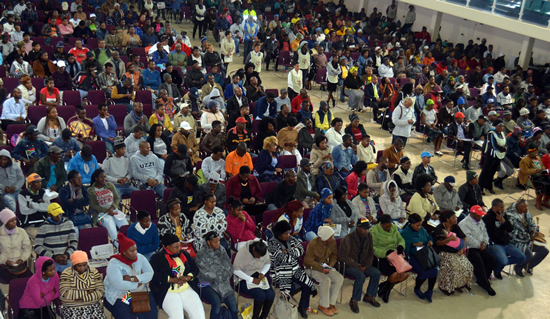
As part of the programme, which is a partnership between the Department of Arts and Culture (DAC) and the Business Association of South Africa (BASA), emerging artists will be given opportunities to apply for funding to further support their ventures.
“The fund will provide opportunities to develop new local content and for that all-important break in their career. Linked to the funding will be a mentorship programme to make sure that these aspirant professionals have the best possible advice and guidance,” said Mthethwa.
Training and mentoring young artists
“The Debut Fund Programme creates training, mentoring and funding opportunities for young artists from all disciplines making their debut. In partnership with BASA, it is anticipated that this fund will support young artists from all over the country to take their first steps as professional artists,” said Mthethwa in his 2017/2018 budget vote.
A call for applications was made in Limpopo, Mpumalanga, Northern Cape, Eastern Cape, Gauteng and Free State from June to August.
According to departmental spokeswoman Zimasa Velaphi applications are open and 25 artists will be selected from each province and announced in due course.
The programme combines DAC Debut Funding with BASA’s Education, Mentorship, and Young Business Professionals Programme, and opportunities to apply for BASA supporting grants.
As part of the Programme, BASA has identified community arts centres, supported by DAC within each province, and collaborated with them. The centres will serve as programme anchors, providing support, assisting with marketing and recruitment channels and serving as a local point of contact between the delegates, BASA and the Department of Arts and Culture.
The programme will be implemented in several phases, under the guidance and supervision of a BASA in-house facilitator. Local representatives from art centres will be trained to become programme co-facilitators.
New facility to provide better teaching, learning
New facility to provide better teaching, learning LondekileA state-of-the-art school library and information centre in the Western Cape will ensure educators have access to management, research and curriculum-related material to promote effective teaching and learning.
The Education Library and Information Service of the Western Cape Education Department (WCED) has moved into new, state-of-the-art premises in Kuils River.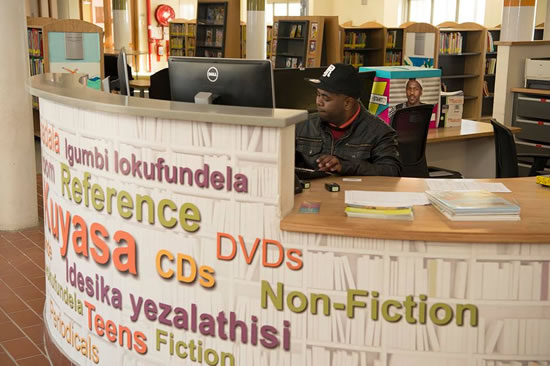
It is now based at the Education Department’s Cape Teaching and Leadership Institute, where the department provides in-service teacher training.
The service supports school libraries and media centres, and teachers visit the centre to source teaching material and ideas.
Brian Schreuder, the head of education in the Western Cape, said at the opening ceremony recently that the occasion was important because it reflects the department’s ongoing commitment to school libraries, the importance of books and the department’s participation in the digital revolution.
A total of 1 252, or 86 per cent, of schools in the Western Cape have library facilities, Schreuder said.
The Education Library and Information Service helps to set up school libraries, provides advice on books to stock and provides block loans of books for up to a term at a time.
Continuous professional development
In addition, it provides resources and support to help teachers incorporate digital technology into their lessons, and obtains licences for education software for use in smart classrooms and computer laboratories. The service provides online resources for continuous professional development of teachers, principals and education officials.
The centre also provides mobile library services to 87 schools in rural areas, mainly farm schools, using buses kitted out as libraries.
The Education Library and Information Service is now expanding its services to include more digital resources, as schools benefit from the province's eLearning Game Changer initiative.
The new facilities in Kuils River include:
- A library of books and digital education material, including software;
- A computer hub, with 10 computers, where teachers can use computers to identify resources they might need;
- A viewing room, to preview digital resources;
- Free wifi;
- Power points throughout the library for use by visitors, using their own devices;
- A seminar and training room with 20 computers, which can accommodate 50 people; and
- A boardroom which can accommodate 15 people and a study area for individual and group work.
Phiri’s musical ends
Phiri’s musical ends Joy The death of musical legend Ray “Chikapa” Phiri has left the music industry poorer.
The death of musical legend Ray “Chikapa” Phiri has left the music industry poorer.
Ray “Chikapa” Phiri was born in Nelspruit, Mpumalanga, in 1947 and started his music career in the late 1960s as a guitarist. He founded a group called The Cannibals, followed by the more well-known Stimela.
With Stimela, Phiri composed and conceptualised new work and the band achieved platinum-selling albums. Minister of Arts and Culture Nathi Mthethwa said Phiri’s music appealed to a new generation of South Africans who were fighting apartheid.
“Their music was urban, racy and African pop at its best and it spoke to the times they lived in. Their songs appealed to new generations of South Africans who came of age in the 1970s and 1980s and who stood their ground and strove for freedom in the last decade of apartheid rule.”
Ray Phiri was an arts activist in Mpumalanga and for many years sat on the board of the National Arts Council of South Africa. He collaborated with many other musicians to advance their music, and founded the Ray Phiri Artists Institute to develop Mpumalanga talent.
We will remember him
He received the Order of Ikhamanga in Silver for his contribution to South African music and his life’s contribution to the transformation of the arts.
Premier of the North West Supra Mahumapelo joined millions of South Africans to pay tribute to Phiri.
He said Phiri’s death came at a time when there was an agreement between him and the North West provincial government to assist the province in revitalise help Mmabana Studios.
“I was also working with the legendary musician, as an artist myself, on a reconciliation, healing and renewal music concert in honour of the late Collins Chabane and to compose the gospel version of Zwakala,” said Premier Mahumapelo.
“This is truly a great loss to the music industry. I wish to, on behalf of the provincial government and the North West community, extend our deepest condolences to his family and friends.
“We will forever remember him and be grateful for his immense contribution in the music industry. May his soul rest in peace,” Premier Mahumapelo said.
Positivity rules the day
Positivity rules the day LondekileA community organisation is showing the children of Bloemfontein’s Phase 7 that a positive attitude and mindful choices can lead to a brighter future.
A positive outlook on life is changing the mindsets of young Bloemfontein residents.
The African proverb “It takes a village to raise a child” is the philosophy behind the establishment of Isolate Iziyobisi in Phase 7, a community organisation that works to uplift local children. Iziyobisi is the Xhosa word for ‘drugs’ and isolating children from substance abuse and gang violence is what prompted the establishment of the non-profit organisation.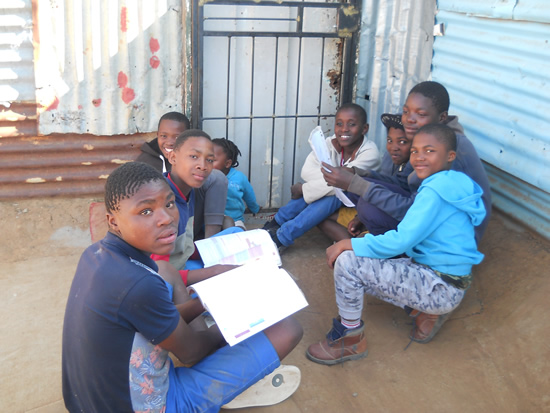
Isolate Iziyobisi was started by four unemployed friends who, although suffering and struggling to survive, wanted to break the cycle of poverty, crime, drugs and jail.
This is done by actively being involved in the lives of vulnerable children through an after-school programme that helps with homework and provides guidance and mentorship to children aged six to 17 years; talent shows and soccer and netball tournaments boost the morale of the community and keep the children’s minds from idleness.
Taking a better path
One of the founding members, Thandolwethu Mbalo, is a former drug addict who uses his experiences to show children a better path. “We decided to do something that will make those who come after us have a different story to ours. We don’t fight drugs directly; our model looks at the root of drug abuse, which is poverty. So we support poor children through food and clothes donated by people,” he said.
Rethabile Moqasa, who joined the organisation last year, is similarly driven to help change the community’s narrative. Moqasa found herself pregnant as a teenager, and now focuses on girl children to uplift them. “I joined Isolate Isiyobisi because I want to play a part in changing the background and lifestyle of the children in Phase 7. I want to bring new hope to the girls, and to encourage them not to make the same mistakes that I did.”
Nkosinathi Mbalo (9) said he used to struggle with maths and English. However, after joining the after-school programme, his marks have improved.
Fifteen-year-old Levoyo Jack, who joined the organisation last year, said Isolate Iziyobisi had kept him from bad things like gangs and smoking. “I’m now focused on good and positive things.”
Mbalo confirms that he has seen positive changes. “The biggest difference I have noticed through Isolate Iziyobisi so far is that the children are focused, although gang violence still reigns in the community.”
Isolate Iziyobisi now has seven members who mentor the children and some of them have even given up their personal laptops to teach the children computer skills.
R100 million for black filmmakers
R100 million for black filmmakers LondekileA government initiative launched in 2014 has helped black filmmakers tackle big productions while creating more jobs in the country’s growing movie industry.
The Department of Trade and Industry (the dti) will have spent R100 million to support emerging black filmmakers through the South Africa Emerging Black Filmmakers Incentive by the end of March 2018.
This was shared by the department’s Nelly Molokoane at the recently-held Emerging Black Filmmakers Workshop, which took place during the annual Durban International Film Festival in KwaZulu-Natal.
This is one of the oldest and largest film festivals in Southern Africa. Held in July, the festival saw more than 200 screenings celebrating the best in South African, African and international cinema.
The incentive scheme is geared towards growing the South Africa film industry and exposing fresh cinematic talent.
The budgeted R100 million has supported the projects of 40 emerging filmmakers. However, Molokoane said that despite the dti’s investment, producers still find it difficult to access the additional funds needed to see their productions through to the end.
Positive results from partnerships
She said the department has now partneredThere is some relief ahead, however. A partnership between with the dti, the Industrial Development Corporation, National Film and Video Foundation, SABC and provincial film commissions will further assist filmmakers.
“The scale of projects has been increasing since the inception of the scheme in 2014. The department initially approved 15 applications; thereafter it increased to 40 over a period of three years. Partnership with these institutions will yield positive results in the near future and we will see more productions being supported.”
She added that workshops would be held in various provinces to assist filmmakers in accessing the available support.
The workshop at the Durban International Film Festival was hosted to assist those that needed training on the incentive scheme, its guidelines and requirement.
Rehad Desai, a beneficiary of the incentive and director of the Marikana documentary Miners Shot Down, said the scheme was the most important development in the South African film industry.
“We are seeing far more films being produced since the launch of the scheme and this means funding of projects happens in a short space of time and one can go into production quicker. This also means our production companies are becoming sustainable,” said Desai. – SAnews.gov.za
Rebuilt EC school brings better education, jobs
Rebuilt EC school brings better education, jobs LondekileThe KwaNdumiso Primary School in Ntongwana Village has been transformed from a mud structure into a fully-equipped school that can hold its own with any educational institution.
The Eastern Cape Department of Education has invested in education by rebuilding a former mud school in Ntongwana village, Lusikisiki, at a cost of R34 million.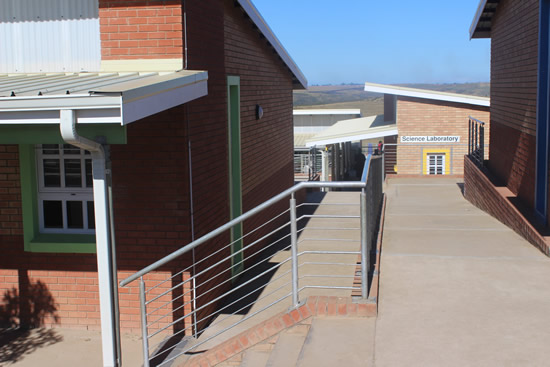
The KwaNdumiso Primary School was opened in 1990 thanks to the drive and initiative of the Ntognwana community and the local parents. Eastern Cape MEC for Education Mandla Makupula saluted the parents “who started this school as they did it from nothing but with a zeal to provide quality education for their children and ultimately transform lives in these communities”.
The school has now been transformed. “The department has taken cognisance of the children and wants to improve their livelihoods and the quality of teaching and learning in these areas,” MEC Makupula said.
He urged parents to continue to support quality teaching and learning in the schools “by being involved in the education of your children and helping to instil positive values that will make these learners responsible citizens”.
Creating job opportunities
The primary school is expected to assist in improve education. It also provided jobs for local people during the construction phase – 69 jobs were created. “Of these, 16 local women were employed and 39 youth got job opportunities,” the MEC said.
All the construction material was sourced locally, supporting local economic development.
It took the Ngquza Hill Local Municipality 13 months to build KwaNdumiso Primary school.
Now, MEC Makupula said, there was no difference between KwaNdumiso Primary School and a school in an urban area, because it had all of the equipment needed for teaching and learning irrespective of the learning area.
“We hand over schools that meet national norms and standards to ensure our learners are taught and provided with equal opportunities compared to those in urban areas.”
SA gets ninth World Heritage site
SA gets ninth World Heritage site JoySouth Africa’s most recent World Heritage site bears testimony to an unchanging way of life that dates back thousands of years – and is a heritage that should be treasured and preserved.
A ninth South African World Heritage site – the ‡Khomani Cultural Landscape – has been added to the United Nation’s Education, Scientific and Cultural Organisation’s (Unesco)prestigious list of sites.
Now recognised by Unesco as a site of universal value, the area covers the entire Kalahari Gemsbok National Park and is part of the Kgalagadi Transfrontier Park bordering Botswana and Namibia.
The ‡Khomani and related San people are the direct descendants of an ancient group of people who inhabited southern Africa about 150 000 years ago.
“This exciting announcement brings with it prospects of development for South Africa and our neighbours, but it has global significance that extends far beyond our region,” said Tourism Minister Tokozile Xasa.
The recognition will focus world attention on this iconic site and its role in the development of modern humans. “It’s where humans came from,” Minister Xasa said.
The vast, sandy region holds archaeological evidence of human occupation from the Stone Age to the present. The nomadic people adapted to the harsh desert conditions, developing specific survival strategies. According to Unesco, “They developed a specific ethnobotanical knowledge, cultural practices and a worldview related to the geographical features of their environment.
“The ‡Khomani Cultural Landscape bears testimony to the way of life that prevailed in the region and shaped the site over thousands of years.”
The landscape has remained relatively unchanged since humans were hunter-gatherers, and is managed by South African National Parks.
A heritage to share with Africa
While Minister of Environmental Affairs Edna Molewa and her department were the official custodians of the site, “this achievement belongs to all the people of South Africa”, Minister Xasa said.
“This is the heritage that our entire nation should treasure and preserve.”
Any development would take into account the need to protect and preserve this unique environment, the cultural practices of the local people, and all the heritage aspects of this amazing cultural landscape, the Minister added.
“We must work together to convert these assets into economic and social benefits, without negatively impacting on the environment, the culture and the dignity of people past and present.”
The Minister applauded local communities for their efforts to preserve their culture.
She added that this acknowledgement of the universal significance of the site would formalise and consolidate the continued preservation of ancient cultural practices and traditions.
The benefits of tourism development in the region would make a big difference in the lives of the local communities, the Minister added.
It also opened up possibilities for integrated tourism development in southern Africa, particularly in partnership with Namibia and Botswana.
The interest in this site was likely to spread further north through the African continent.
“We are always willing to work with our African counterparts to link and co-develop cultural and heritage products for the benefit of regional tourism, which makes a significant contribution to many economies on the continent,” Minister Xasa said.
Other African Unescosites
The Minister also congratulated Angola and Eritrea for the sites in their countries that have won Unesco recognition. “These announcements once again demonstrate the unique cultural and heritage tourism assets we have in Africa.”
Unesco has added the City of Asmara in Eritrea and the town of Mbanza Kongo in Angola to the list of World Heritage sites.
Mbanza Kongo was the capital of the Kingdom of Kongo, one of the largest states in southern Africa between the 14th and 19thcenturies.
Asmara, the capital of Eritrea, developed from the 1890s to become “an exceptional example of early modernist urbanism at the beginning of the 20th century”, according to Unesco.
South Africa’s World Heritage sites
The other eight world heritage sites in South Africa are:
- the fossil hominid sites of South Africa;
- Maloti-Drakensberg Park;
- Mapungubwe Cultural Landscape;
- Vredefort Dome;
- Richtersveld Cultural and Botanical Landscape;
- Robben Island Museum;
- iSimangaliso Wetland Park; and
- the Cape floral region protected areas.
SA to chair SADC from August
SA to chair SADC from August JoyAfrica News
As chair of SADC, SA will host the 37th Ordinary Summit of Heads of State and Government in Pretoria.
South Africa will assume the role of chair of the Southern African Development Community (SADC) from August 2017, taking over from the Kingdom of Swaziland.
SADC was established in 1992 as a regional body responsible for the development of the southern region of the African continent. It is committed to regional integration and poverty eradication, through economic development and ensuring peace and security.
The community is made up of 15 member states, namely Angola, Botswana, Democratic Republic of Congo, Lesotho, Madagascar, Malawi, Mauritius, Mozambique, Namibia, Seychelles, South Africa, Swaziland, Tanzania, Zambia and Zimbabwe. Each country has the opportunity to chair SADC on a one-year term.
South Africa will host the 37th Ordinary Summit of Heads of State and Government in August 2017, in Pretoria, under the theme ‘Partnering with the private sector in developing industry and regional value chains’.
The summit, which takes place on 19 and 20 August, will be preceded by the Senior Officials’ Meeting from 11 to 14 August, the Ministerial Meeting on 16 August and the Double Troika on 18 August. All the meetings will take place at the Department of International Relations and Cooperation OR Tambo Building in Pretoria.
The Troika is made up of three countries: the incoming chairperson, current chairperson and the outgoing chairperson. They all report to the summit chairperson.
“We are extremely honoured to have been elected as the incoming Chairperson of SADC. This is a responsibility we take very seriously,” said President Jacob Zuma in his acceptance speech last year.
“We extend our profound gratitude to SADC member states for the trust and confidence bestowed on us. We equally wish to affirm our total commitment to carrying out this huge responsibility to the best of our ability.”
This month in history
This month in history Joy The 1956 Women’s March
The 1956 Women’s March
On 9 August 1956, some 20 000 women from across the country, some from as far afield as Cape Town and Port Elizabeth, filled the amphitheatre of the Union Buildings in Pretoria to present signed petitions opposing the apartheid law that compelled African women to carry passes.
Neither Prime Minister JG Strijdom nor any of his senior staff were there to see the women, so the leaders left the huge bundles of signed petitions outside Strijdom's office door.
Thereafter, the crowd stood in utter silence for 30 minutes before breaking into Nkosi Sikelel’ iAfrika. Without exception, those who participated in the event described it as a moving and emotional experience.
Source: South African History Online – www.sahistory.org.za
Training for emerging and established exporters
Training for emerging and established exporters JoyThe Department of Trade and Industry’s Global Exporters Passport Programme is offering training to the export sector.
 If you are in the export business, or would like to get into this sector, the Department of Trade and Industry (the dti) is offering training opportunities.
If you are in the export business, or would like to get into this sector, the Department of Trade and Industry (the dti) is offering training opportunities.
The department is inviting existing and emerging exporters to apply for support and training under the Global Exporters Passport Programme, which forms part of the critical components for the National Exporter Development Programme, to prepare small and medium enterprises for the successful expansion of their businesses into international markets.
Interested parties are required to complete and submit an export-readiness assessment form (obtainable from the department’s website at www.thedti.gov.za/invitations/Exporter_Development.pdf), which will help determine the appropriate level of training that each company needs.
Training is divided into four phases, namely an introduction to exporting, planning for exports, market entry, and global exporting.
The first phase of the Global Exporters Passport Programme provides foundation training for enterprises on issues, modalities and the benefits of exporting.
It is designed to teach enterprises basic export skills, export terminology, information about the international trading environment, Incoterms principles, the fundamentals of foreign market research and the concept of cultural barriers.
Offering wide-ranging training
The phase includes three registered South African Qualifications Authority (SAQA) unit standards that provide 16 credits towards the National Certification: Export Administration qualification.
The Introduction to Exporting training covers the complete export cycle, differences between local and international trade, mode of transport, methods of payment, foreign currencies and exchange controls, export documentation, freight cost elements, duties and other elements.
The second phase focuses on market analysis and the development of a company’s export strategy and plan. It includes two registered SAQA unit standards that provide 12 credits towards the National Certification: Export Administration qualification.
The training covers market research, to gather data from external sources and within the company; competitor analysis; air, rail, harbour and road distribution; banking; financial; e-commerce and communication networks.
The third phase addresses market-entry issues, targeting specific markets based on the export marketing plan developed in phase two.
It also assists enterprises with the implementation of the marketing plan. The training covers doing business in a specific region, market access issues, customs and taxation, product branding for a specific market and market research.
The last phase includes a one-day workshop between the department, stakeholders and exporters on issues affecting exports and exporters.
Areas of focus include the current developments in international markets, latest opportunities and threats affecting the export market and developments in trade protocols and agreements.
Water-wise trio off to Sweden
Water-wise trio off to Sweden JoyMokgotho Temogelo Thami, Mmola Desmond Kutullo and Nkwane Wayne Luka have flown to Stockholm, Sweden, to represent South Africa at the annual World Water Week.
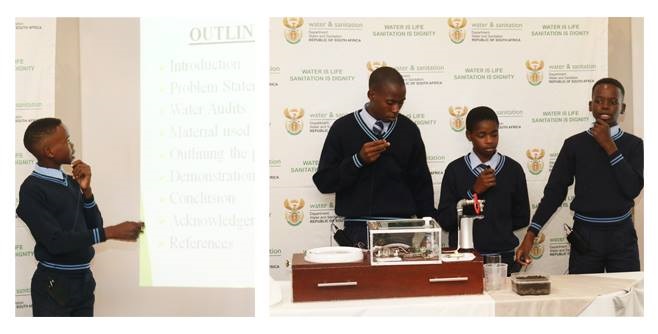 The grade 11 pupils at Lebeko Senior Secondary School in Phalaborwa were the national winners of the SA Youth Water Prize, held in Pretoria in June, and qualified to represent South Africa at the Stockholm Junior Water Prize.
The grade 11 pupils at Lebeko Senior Secondary School in Phalaborwa were the national winners of the SA Youth Water Prize, held in Pretoria in June, and qualified to represent South Africa at the Stockholm Junior Water Prize.
This prestigious competition is open to competitors between the ages of 15 and 20 from 30 countries. Winners are chosen on the level of innovation their solutions show and the environmental, scientific, social or technological significance of their research or design.
The objectives of the competition are to raise awareness of the importance of conserving and protecting natural resources.
The SA Youth Water Prize is a Department of Water and Sanitation (DWS) educational outreach project called 2020 Vision for Water Education Programme.
Beyond its collaboration with the Stockholm Water Foundation, the department has partnered with the Department of Science and Technology to respond to the challenge of scarce skills.
Initiative and innovation
South Africa has won the Stockholm Junior Water Prize competition twice – in 2003 and 2005.
Judges have been generally impressed by the quality of South African entrants. South African entries, judges have pointed out, have always matched international entrants in terms of innovation. However, as a judge points out, “They are more focused on local issues, and more practically oriented than many of the other countries’ entrants.”
Their winning innovation, a device to help schools and their community to save water, also won them full bursaries from the DWS. Winners who accept the full bursary prize are encouraged to follow a career path in a water sector-related field.
Using a two-part system, the device discharges water when needed and only for a set time. The young innovators also added soak-away material to absorb leaking water that is then returned to the water tank.
The South African learners’ prototype system was built with donated materials or supplies rescued from the trash.
On their return from Sweden, the Lebeko pupils will get to meet business and manufacturing partners who can turn their prototype into market-ready products.
World Breastfeeding Week celebrated in August
World Breastfeeding Week celebrated in August LondekileBreastfeeding is arguably the best start in life you can give to your newborn baby.
The first week in August is World Breastfeeding Week, an international campaign that supports and promotes breastfeeding to improve babies’ health.
Breastfeeding is arguably the best start in life you can give to your newborn baby. And while it is not always easy, getting advice or help from a professional in the early stages will be well worth the effort for you and your baby.
Why breast is best for baby
Breast milk is easily digestible and has the perfect mix of vitamins, protein and fat, giving babies the best nutrition to help them grow.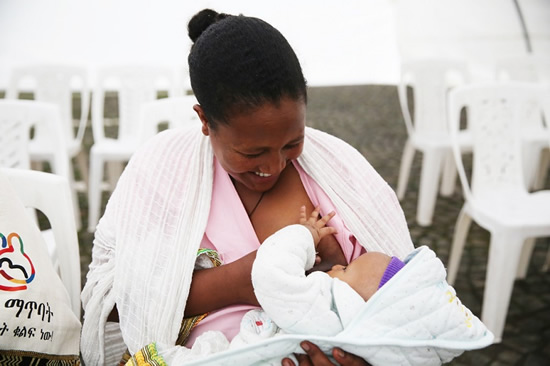
In addition to containing all the vitamins and nutrients your baby needs in the first few months of its life, breast milk is packed with disease-fighting substances that protect your baby from a long list of illnesses.
It helps your baby fight off viruses and bacteria, and also reduces your baby’s risk of developing allergies or asthma. Studies also indicate that stomach viruses, lower respiratory illnesses, ear infections, and meningitis occur less in breastfed babies and are less severe when they do occur.
Furthermore, exclusive breastfeeding – where the baby is not fed any solid food, formula or water – is deemed to offer the most protection in the first six months.
The physical closeness in the form of skin-to-skin touching and eye contact promote mother-and-child bonding and helps your baby feel secure.
Benefits for mom
Although breastfeeding can be hard work in the beginning, besides the many health advantages for your baby, you also stand to benefit in many ways.
Firstly, the baby’s sucking during breastfeeding causes the mother’s uterus to contract and reduces the flow of blood after delivery. It also releases a hormone – oxytocin – that not only promotes a feeling of warmth and calm, but also helps your uterus return to its pre-pregnancy size.
In terms of health benefits, breastfeeding lowers your risk of breast and ovarian cancer and research indicates it may also lower your chances of osteoporosis. In addition, it burns extra calories.
And of course when it comes to cost, breastfeeding is the most economical way for you to provide your baby with the nutrition needed without having to spend a cent. It is also convenient and saves you the time and trouble of having to prepare formula and sterilise bottles, allowing you more time to bond with your baby instead.
Many new mothers worry that they don’t have enough milk, and stop breastfeeding in favour of formula when they see their baby’s weight dropping.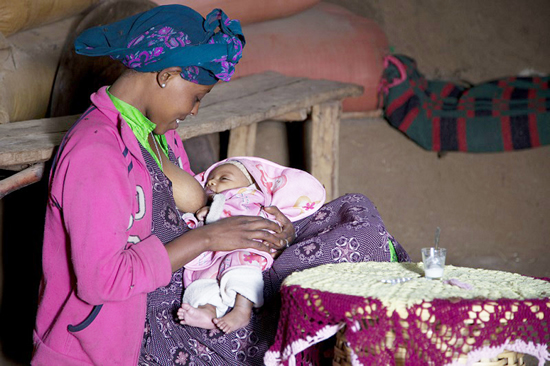
However, remember that some weight loss in the first few days is completely normal and most babies return to their birth weight within two weeks of delivery. Normal weight gain is between 20 and 30 grams per day, or between 150 and 210 grams per week.
If your baby is not steadily gaining weight every week, your midwife or nursing professional will be able to advise you whether you should be topping up with formula.
How to breastfeed
Everyone will have their own opinion when it comes to how you should breastfeed your baby. However, what works for someone else may not necessarily work for you.
It’s best to take it day by day and find what works best for you and your baby. Let your baby feed when it is hungry or you will risk decreased milk production for yourself and poor weight gain for your baby.
- Make sure you are sitting comfortably and you are well supported.
- Hold your baby close to you, facing your chest.
- Position your baby on his side, with his nose opposite your nipple.
- Support your breast from underneath.
- Position your fingers well back from the areola/nipple, so your can take a big mouthful of breast tissue.
- Touch your baby’s lips with your nipple to encourage him to open his mouth wide.
- Make sure your baby’s mouth is very wide (like yawning), then bring him to the breast quickly, chin first.
- Make sure your baby’s bottom lip is well down over the areola, ‘off centre’.
- Continue to support your breast until your baby is sucking and swallowing, in a deep rhythmic pattern.
- If you experience pain once your baby has started swallowing, take your baby off and re-attach.
- Remember to insert a clean finger between the baby’s gums, to break the seal when taking your baby off the breast.
You know your baby is feeding well when:
- After some initial short frequent sucks to stimulate milk flow, your baby begins to swallow. Sucking becomes slower, deeper and more rhythmic with rest periods between each sucking burst. As the feed progresses, the sucking bursts become shorter and the rest periods longer.
- You can hear or see your baby swallowing.
- Your baby is settled after most feeds.
- Your baby is alert, active and content when awake.
- Your baby has at least six soaked cloth nappies, in 24 hours, after your milk ‘comes in’; disposable nappies should be heavy and spongy.
- Your baby has at least one yellow, loose bowel action every day, after initial meconium (the first bowel action) has passed.
Where to get help and support Talk to the nurses at your local hospital or clinic. La Leche League of South Africa is a voluntary organisation that provides information and support to women who want to breastfeed their babies. www.llli.org/SouthAfrica.html
info@motherinstinct.co.za provides a list of lactation experts and support groups
Source: National Department of Health and Government Employees Medical Scheme
Young people building ‘Africa we want’
Young people building ‘Africa we want’ JoyAfrica News
Young Africa can shape that future by volunteering with the African Union’s (AU) Youth Volunteer Corps.
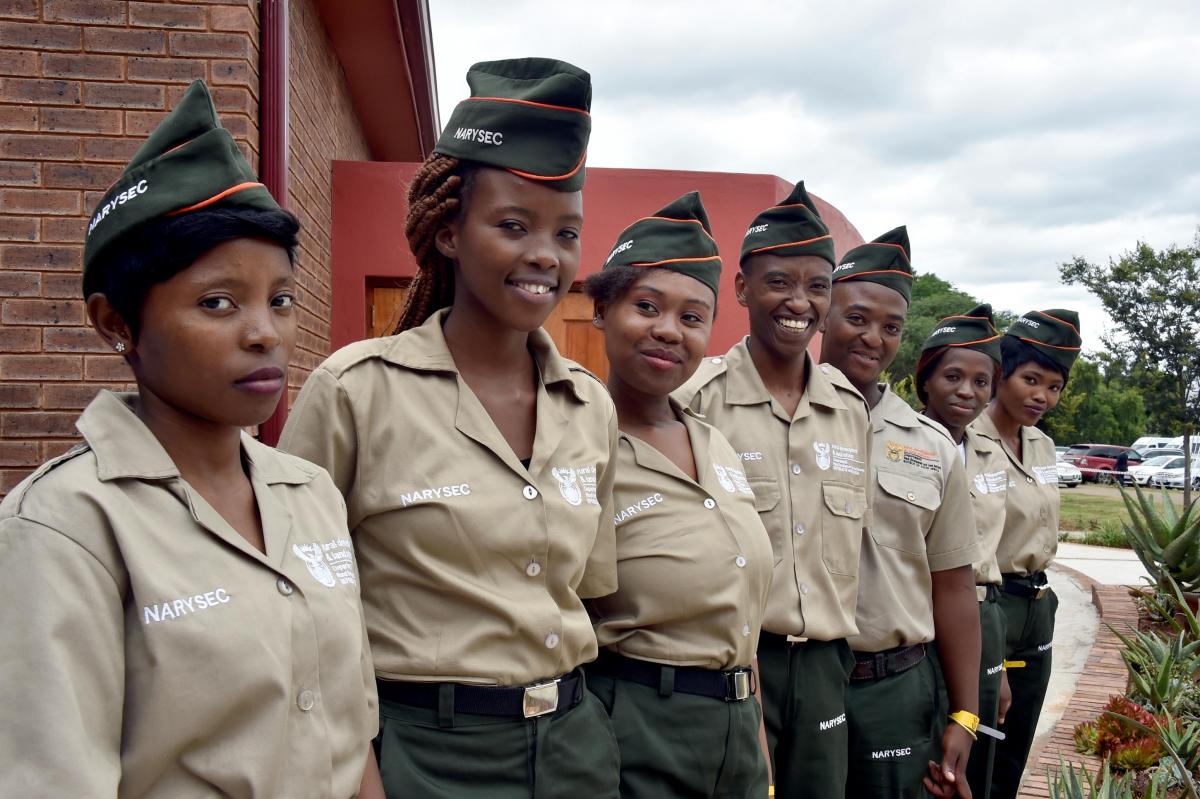 The African Union’s Agenda 2063 lays out the path for sustainable growth for Africa for the next four decades.
The African Union’s Agenda 2063 lays out the path for sustainable growth for Africa for the next four decades.
Every year applications open up for the organisation’s Youth Volunteer Corp, which brings together involved young people from all African Union members to work on projects in the education, health and HIV/ Aids, peace and security, information and communications technology, business and youth entrepreneurship, agriculture and environment sectors.
By giving African youngsters an opportunity to volunteer across the continent the AU is hoping to create a core of young Africans who will embody the Agenda 2063 slogan, ‘The Africa we Want’. Volunteers are encouraged to share skills and creativity and learn from each other.
The end result, the AU hopes, is a more connected and integrated Africa. As Ambassador Jean Baptiste Natama, the AU Commission Chief of Staff, told the group of 2016 volunteers, a continent that works together will be stronger and more relevant globally.
“As young people, you must move away from classical patterns, dare to tell our African history and make yourselves responsible for your destiny and the continents. Africa can dominate the world and it is within your ability to make this possible.”
Bringing in the voice of the youth
The volunteer programme is designed to bring the voice of the youth into discussions about policy development.
As the Ambassador explained, “We hope young people rediscover the true identity of African people. An identity based on the Pan African values of Ubuntu, hard work and humility.”
After a two-week training course, volunteers are deployed to a number of organisations across the continent for a year.
After his training, volunteer Toby Fayoyin said, “After spending these two weeks with friends from 28 countries, the sense of African integration has taken up life in all of us.” Tunisian Refka Dahmeni was also an AU volunteer. After her stint she said, “We were encouraged to be leaders in our own communities. We lived this vision of pan Africanism and it changed our mentalities.”
For more information: www.au.int/web/en/volunteer/african-union-youth-volunteer-corps
eThekwini lifeguard wins Four Elements Ocean Challenge
eThekwini lifeguard wins Four Elements Ocean Challenge Joy“It was a great swimming course and the race was all about ocean conservation. For someone who spends every day on the beach, this is something I am passionate about,” says Sanele Nxumalo.
 An eThekwini lifeguard made the city proud in the biggest Four Elements Ocean Challenge recently, taking first place.
An eThekwini lifeguard made the city proud in the biggest Four Elements Ocean Challenge recently, taking first place.
Challenge winner Sanele Nxumalo (30) was one of 130 daring participants signed up for the fourth annual Four Elements Ocean Challenge – a five-kilometre open-water swim from eThekwini’s Point Yacht Club to the Country Club Beach.
Nxumalo describes the Challenge as “one of the most important races of the year” as it provides a great opportunity to interact with the public he is dedicated to protecting on his home turf.
The professional lifeguard came second in 2015 and third in 2016.
“It was a great swimming course and the race was all about ocean conservation. For someone who spends every day on the beach, this is something I am passionate about. It’s important for people to be taught the importance of conservation especially on Durban’s beachfront, which is one of the country’s most iconic sites,” he said.
Nxumalo is a three-time Lifeguard Endurance Champion, the winner of the 2016 Miway Surf Swim competition, a Lifesaving Ironman and a silver medal winner in the senior men’s surf swim category at the South African Stillwater Nationals.
“It was exciting to have a number of newcomers from the lifeguard fraternity joining us on the swim this year,” he said, adding that lifeguards were always excited for any surf sport-related event.
Protecting the city ís beaches
Thando Thusi, who has been involved with the eThekwini lifeguard unit in various roles for the past 18 years, also took on the 2017 Challenge.
He explains that there is often a misconception that lifeguards spend their time relaxing on the beach. But the reality is very different. “Becoming a lifeguard is not an easy process and we train in the ocean daily to keep fitness levels up and check safety conditions,” he says.
The challenge introduced a new prize category this year, with prizes awarded to the first three professional eThekwini lifeguards who completed the swim. Nxumalo, Thusi and Lucky Mabuya walked away with the prizes.
Challenge CEO Olivia Taylor says the organisation wanted to honour the unsung heroes who had made a professional career out of looking after visitors to Durban’s beaches. “However, the event was not only about winning prizes, it was about a group of committed swimmers celebrating our fragile and beautiful ocean and raising funds to educate young environmental entrepreneurs.”
Taylor, a student at the University of Stellenbosch, established Four Elements Conservation NPC, a non-profit environmental preservation organisation, five years ago, when she was 14 years old.
The Four Elements Ocean Challenge is one of the organisation’s projects that raise funds for, and awareness of, ocean conservation.
Funds raised from this year’s swim will go towards the launch of an online education programme that focuses on environmental entrepreneurship for youth.
‘Green’ in on curriculum at Jeppe Park Primary
‘Green’ in on curriculum at Jeppe Park Primary LondekileThe school is a living laboratory for green construction and its innovative education curriculum will improve the learning experience.
A disused shoe factory in downtown Johannesburg has been reclaimed as a primary school for 45 children. It also recently became the first school in Africa to receive a four-star Green Star rating for its sustainable and ecologically friendly design.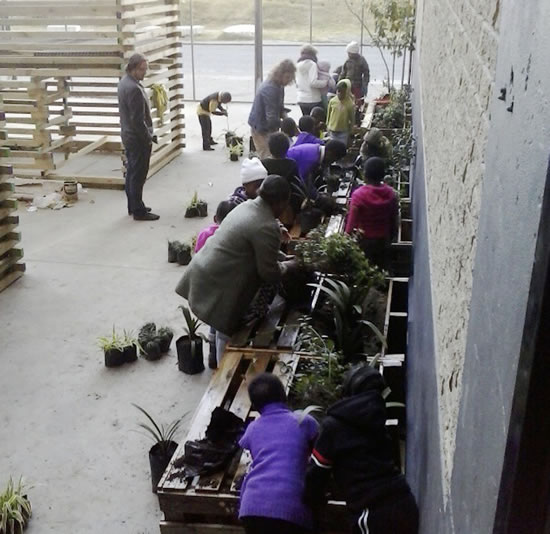
Jeppe Park Primary is a living laboratory for green construction and its innovative education curriculum will improve the learning experience.
Planned to offer high-quality, low-cost education to inner city children, the school benefitted from the help of Johannesburg-based architects and construction professionals in the green economy.
The school’s small construction budget led to innovative solutions that are being celebrated. Dry-wall offcuts and wooden pallets were recycled to build classrooms and furniture, the library floor was laid using reclaimed wood, rubble from the renovations was used to build a new ramp, and recovered corrugated sheeting became new bathroom ceilings.
The play area was designed to be a part of the learning process and nature forms a holistic part of everyday life at the school. As well as indoor planting and a courtyard with recycled palette planters for trees and plants, the school has started growing vegetables to supplement the children’s lunches.
Melanie Smuts, the school’s founder and CEO of non-governmental organisation Streetlight Schools, said, “Our major considerations were cost and how to create a child-friendly space in an industrial area. But it has been amazing to see how many of these principles also lead to designing an education space that is sustainable and environmentally friendly. And our students love it.”
Environmental rating
The renovation of the building and its waste, energy and water systems are all environmentally-friendly. It serves a more noble purpose, says Dorah Modise, CEO of the Green Building Council of South Africa. “Not only does this school bring healthy green spaces and green thinking to disadvantaged scholars, it is also starting the very necessary process of greening the education sector. It will go a long way towards helping these children understand that resources are finite and come at a price.”
There are three rating levels, four to six stars, that apply to different sectors including interiors, retail, education and residential buildings. Jeppe’s four-star rating means it is an example of best practice in its field.
